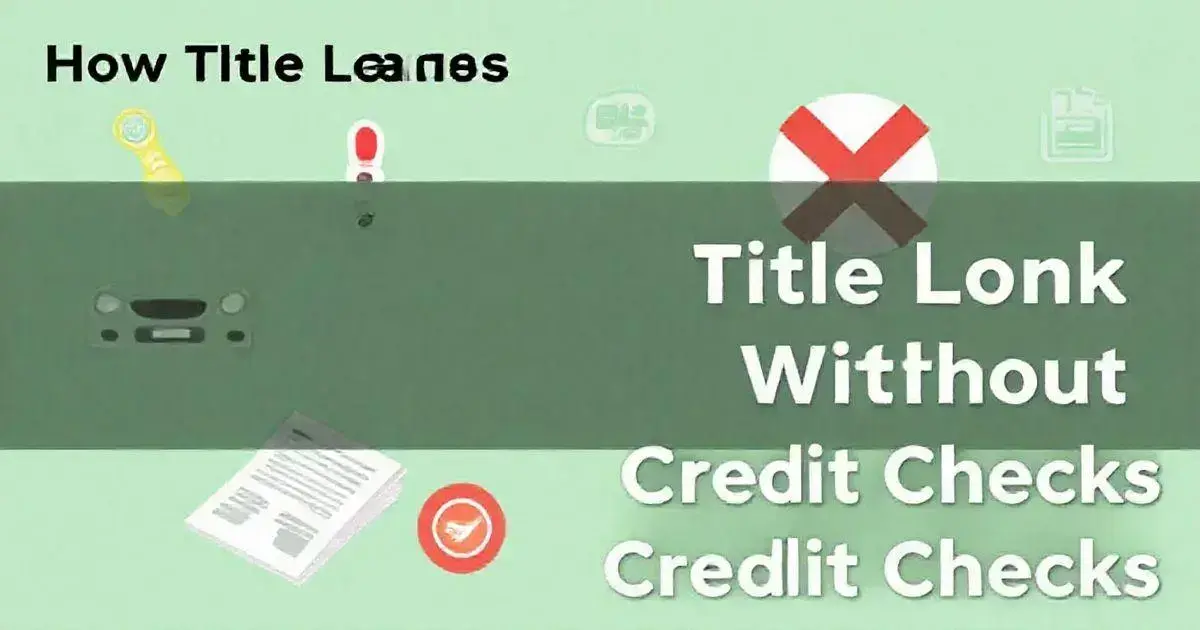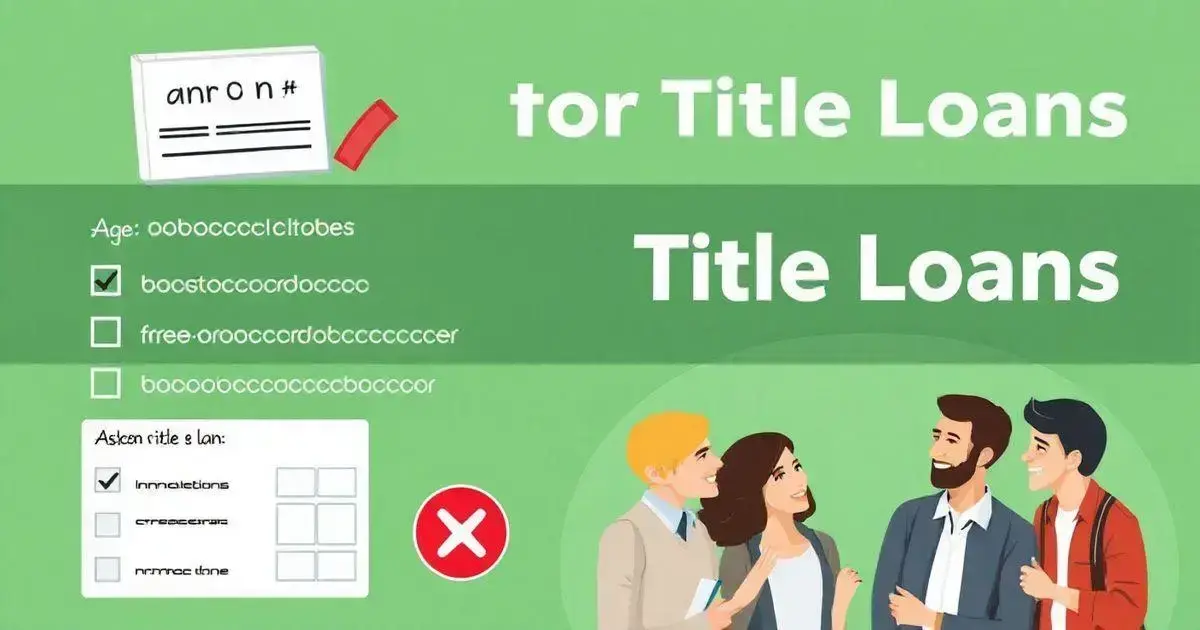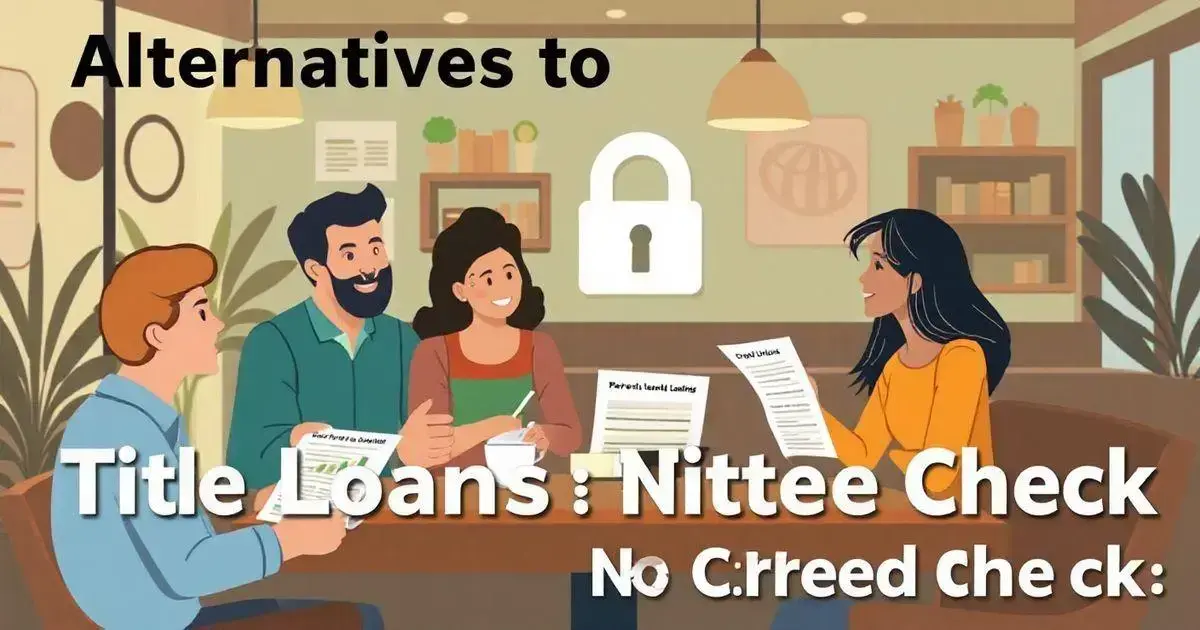Understanding Title Loans
Understanding title loans is essential for anyone considering this financial option. Title loans allow you to use your vehicle as collateral to secure a loan, which means your credit score may not impact the outcome. Unlike traditional loans, these are often available quickly, making them a popular choice for urgent financial needs.
To qualify for a title loan, you usually need to present the title of your vehicle, proof of income, and identification. The amount you can borrow typically depends on the value of your vehicle. It’s crucial to know that while these loans are fast, they come with risks, including potentially high-interest rates.
Many borrowers find themselves in a cycle of debt if they do not repay the loan on time. Therefore, it’s important to consider your ability to repay before taking one. Understanding all these factors can help you make an informed decision when exploring title loans no credit check.
How Title Loans Work Without Credit Checks

Understanding how title loans work without credit checks is a key aspect of financial literacy. These loans allow individuals to secure funds by using their vehicle’s title as collateral, which speeds up the approval process.
Because lenders do not check credit scores, those with poor credit histories can still qualify. This makes title loans appealing for urgent financial needs.
The process typically involves filling out an application, providing the vehicle title, and sometimes, proof of income. Once approved, borrowers can receive cash quickly, often on the same day.
However, it’s important to be aware of the loan terms, including interest rates and repayment schedules. Failure to repay can lead to losing your vehicle, so careful planning is crucial.
Additionally, comparing lenders is advisable to find the best terms. Understanding the intricacies of these loans can empower you to make wise financial decisions, especially when seeking title loans no credit check options.
Benefits of Title Loans No Credit Check
Understanding the benefits of title loans no credit check can provide immediate financial relief without the stress of traditional credit checks. One significant advantage is the speed at which these loans can be accessed. Borrowers can often secure funds within 24 hours, making them ideal for emergencies or urgent expenses.
Another benefit is that these loans are available to individuals with poor credit histories. Since lenders focus on the vehicle’s value instead of the borrower’s credit score, many people can qualify for a loan. This accessibility can help individuals overcome temporary financial setbacks.
Additionally, title loans typically involve straightforward application processes. Most lenders require minimal documentation, primarily the vehicle title and proof of income, making it easier for borrowers to complete their applications swiftly. However, it’s crucial to understand the terms and conditions to avoid pitfalls like high-interest rates.
While title loans no credit check come with their set of risks, like repossession of the vehicle, their quick availability and lower barriers can serve as a financial lifeline. It’s essential to weigh these pros and cons carefully.
Eligibility Requirements for Title Loans

When looking for title loans, it is important to understand the eligibility requirements. Different lenders may have slightly different criteria, but several common factors are generally considered.
First, you must own a vehicle outright and have the title available for securing the loan. This means that there should be no liens on the car. Proof of ownership is crucial to demonstrate that you have clear rights to the vehicle.
Additionally, lenders often require some form of income verification to ensure that you can repay the loan. This may include pay stubs or bank statements. Having a steady income can significantly improve your chances of approval.
Another important requirement is to be of legal age, usually at least 18 years old. You will also need a valid government-issued ID to verify your identity. If you meet these basic eligibility criteria, you can begin the application process for title loans no credit check.
Keep in mind that while these loans may be easier to obtain, it’s essential to read the terms carefully to avoid any surprises.
Exploring Risks of Title Loans
Exploring the risks of title loans is essential before committing to this financial option. While they can provide quick cash, several potential downsides exist. One significant risk is the high-interest rates that often accompany these loans.
Borrowers may find themselves in a cycle of debt if they cannot pay the loan back promptly. Late fees and increasing interest can quickly add up, making repayment more difficult.
Another risk is the possibility of losing your vehicle. Since the loan is secured by the vehicle title, failing to repay the loan can lead to repossession. This can be particularly devastating for those who rely on their vehicles for daily commutes or family needs.
Additionally, the lack of credit checks might lead some borrowers to overlook their financial stability. It’s crucial to evaluate your ability to repay the loan before taking one out. Finally, some lenders may engage in predatory practices, so it’s important to research lenders thoroughly and read all terms carefully.
Alternatives to Title Loans No Credit Check

When considering alternatives to title loans no credit check, it’s essential to explore various options that can provide financial relief without the risks involved with title loans.
One common alternative is a personal loan from a bank or credit union. These loans typically require a credit check, but they may offer lower interest rates and more manageable repayment terms.
Another option is peer-to-peer lending, which connects borrowers with individual investors. This method often has more flexible credit requirements and can be a viable option for those with less-than-perfect credit.
Additionally, consider utilizing community assistance programs that may offer financial support during tough times without the need for loans.
Credit cards can also serve as an alternative, especially if you have a card with a low interest rate or a promotional 0% APR offer. However, it’s crucial to avoid overspending and ensure you can pay off the balance in time to avoid high fees.
Finally, exploring side jobs or freelance work can help generate extra income to address financial needs without taking on debt. Choosing the right alternative can help you manage your finances better and avoid the risks associated with title loans.
How to Apply for Title Loans
Applying for title loans is a relatively straightforward process, which can be a key factor when you need fast cash.
To get started, the first step is to find a reputable lender that offers title loans. Many lenders are available online and in-person. Ensure to check their terms, interest rates, and customer reviews to select the best option.
Once you’ve selected a lender, you will need to gather necessary documents. Typically, you’ll need to provide the vehicle title, proof of income, and identification. Having these documents ready can speed up the application process.
The next step involves filling out the loan application, which can often be done online or in person. During this process, the lender may assess the vehicle’s value. They may perform a physical inspection or ask for details such as the make, model, year, and condition of the vehicle.
After the application is submitted, the lender will review it and determine your eligibility for the loan. If approved, you can receive the funds quickly, often in the same day. Remember that it’s essential to read the loan agreement carefully before signing.
Understanding the terms can help you avoid any potential pitfalls.
Managing Your Title Loan Responsibly

Managing your title loan responsibly is crucial to avoid falling into a cycle of debt.
First, it’s important to understand the loan terms and the total amount you owe, including interest and fees. This knowledge can help you budget effectively and plan your repayments.
Set a clear repayment schedule and stick to it. By making your payments on time, you can avoid late fees and additional interest. If you encounter financial difficulties, consider contacting your lender to discuss options. Many lenders may offer repayment plans or extensions if you explain your situation.
Another essential tip is to not borrow more than you need. Take only what you can comfortably repay, as larger loans can lead to significant financial stress. Also, avoid taking out multiple loans simultaneously, as this can further complicate your financial situation.
Lastly, consider building an emergency fund to help you avoid future reliance on loans. This safety net can provide peace of mind and help you manage unexpected expenses without resorting to high-interest loans.
Frequently Asked Questions about Title Loans
When considering title loans, many people have questions about how they work and their implications. One common question is, ‘What is a title loan?’ A title loan is a secured loan where the borrower uses their vehicle as collateral. This means that the lender holds the vehicle title until the loan is repaid.
Another frequent concern is, ‘Can I get a title loan with bad credit?’ Yes, many lenders do not perform credit checks for title loans. Instead, they focus primarily on the value of the vehicle being used as collateral. However, this can lead to higher interest rates.
A question that often arises is, ‘How much can I borrow?’ The amount you can borrow typically depends on the market value of your vehicle. Lenders will usually offer a percentage of the vehicle’s value.
People also wonder, ‘What happens if I can’t repay my title loan?’ If you fail to make payments, the lender can repossess your vehicle. It is crucial to have a repayment plan in place to avoid this situation. Understanding these FAQs can help you feel more confident in your decision-making process when it comes to title loans.
Frequently Asked Questions about Title Loans
What is a title loan?
A title loan is a secured loan where borrowers use their vehicle as collateral to secure the loan.
Can I get a title loan with bad credit?
Yes, many lenders do not perform credit checks for title loans, focusing instead on the vehicle’s value.
How much can I borrow with a title loan?
The amount you can borrow typically depends on the market value of your vehicle.
What happens if I can’t repay my title loan?
If you fail to make repayments, the lender can repossess your vehicle, which emphasizes the importance of having a repayment plan.
What are the eligibility requirements for title loans?
You generally need to own a vehicle outright, provide income verification, and have a valid ID.
Are title loans safe?
While they offer quick access to cash, title loans come with risks such as high-interest rates and potential vehicle repossession.
What alternatives are there to title loans?
Alternatives include personal loans, peer-to-peer lending, community assistance programs, and using credit cards with low-interest rates.
